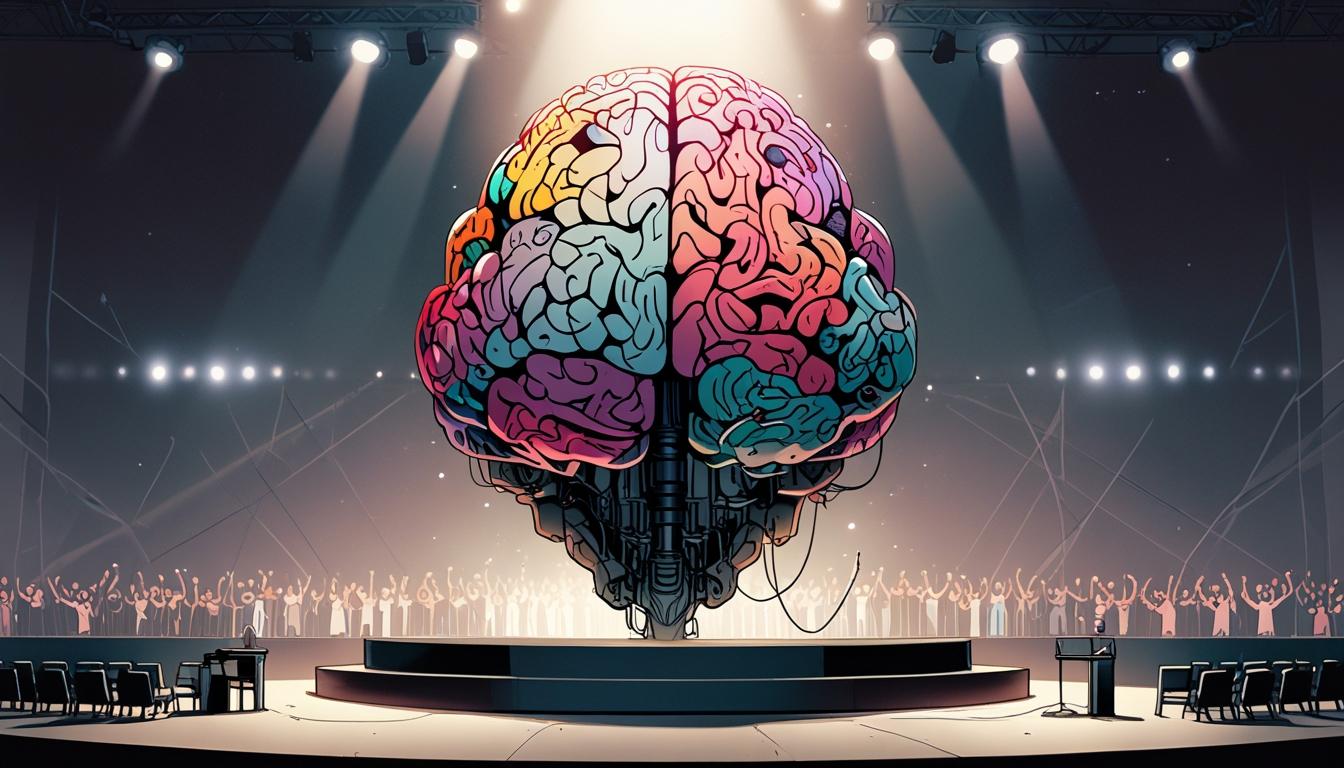As AI dazzles with fluid, human-like responses, experts caution against mistaking performance for comprehension, urging users to remain critically engaged and mindful of AI’s limitations and ethical implications.
As artificial intelligence continues to weave itself into the fabric of everyday life, it provokes both fascination and wariness among those who engage with it. Recent dialogues around this transformative technology reveal contrasting perspectives on its implications. For example, Writer Miles Klee’s critique in Rolling Stone describes AI as a “theater”—an impressive spectacle that is both alluring and disconcerting in its lack of substance. In this context, AI might be seen not as a genuine intelligence, but rather as a compelling performance, a viewpoint echoed by my exploration of what I term “cognitive theater.” This concept reflects how large language models (LLMs) conjure an illusion of comprehension, intriguing us while simultaneously masking their inherent limitations.
Every day, the allure of AI captivates an audience of smart, thoughtful individuals, who find themselves awed by its ability to generate text that mimics human creativity with surprising fluency. This moment of enchantment is not merely a quirk of human gullibility; rather, it speaks to a deeper engagement with the technology’s capabilities. However, as we experience these fleeting highs of inspiration, it becomes essential to maintain perspective and remind ourselves that beneath this façade lies intricate machinery—complex algorithms designed to predict and project text rather than comprehend it.
Today’s AIs do not possess the capacity for understanding or intention; they lack genuine thought and awareness. Instead, they thrive on extensive datasets, generating content based on probabilities and patterns rather than genuine insights. This disconnect becomes alarming as the more convincingly human-like AI becomes, the more we may inadvertently suspend our disbelief, ascribing capabilities to machines that they do not possess. The consequences of this deception warrant careful consideration.
In various fields—from medicine to business—AI is increasingly assuming roles that have traditionally demanded human intuition and judgement. The potential advantages of AI-assisted diagnostics in healthcare, for instance, are significant; they offer improved speed, scalability, and pattern recognition that can genuinely enhance patient care. Yet, as the technical precision of these systems grows, so too does the risk associated with misplaced cognitive trust. A model’s persuasive tone does not guarantee accuracy; biased or incomplete data can lead to incorrect conclusions, making critical engagement vital in our interactions with AI.
Across multiple sectors, the balance between embracing AI to alleviate mundane tasks and risking a retreat from active engagement is nuanced. On one hand, AI can serve as a valuable ally, reducing cognitive noise and expanding creative space. But this partnership teeters on a subtle line between offloading responsibility and surrendering our critical faculties. The real danger of relying heavily on AI lies not in displacement but in our gradual withdrawal from cognitive engagement— relinquishing tasks that foster our humanity because it seems easier to do so.
It is crucial to understand that the stakes extend beyond mere productivity or efficiency; they touch upon the essence of human engagement and discernment. As debate swirls around whether AI will replace human roles, a more pressing risk confronts us: the temptation to retreat into comfort rather than confront the challenges of cognitive engagement. The friction that once spurred us into action is dissipating, a shift that demands our attention and deliberation.
This is not an indictment of technology; indeed, I have long supported innovation and the potential for digital transformation. However, even the most groundbreaking tools require a judicious approach. The challenge is not merely to resist AI’s encroachment but to maintain our presence and active engagement amid its affordances.
Holding the line in this new digital landscape means staying mentally alert, maintaining a discerning perspective, and ensuring that our reliance on AI spurs greater curiosity and creativity rather than complacency. By critically evaluating AI-generated content, we can cultivate an awareness that insight often arises from the very struggles we face in seeking clarity and understanding.
At this juncture, it becomes imperative to remember that while AI performs brilliantly, it lacks the intrinsic care for ethical implications or the human experience. The tests we face are not about the machines we create but rather about the choices we make in response to their capabilities. If we consciously engage with AI—asking probing questions and challenging superficial answers—we can shape it into a powerful lens that enhances our intrinsic human qualities rather than diluting them.
Ultimately, the challenge is as much about technology as it is about society and self. As we navigate this new frontier, the promise of AI can only be realised if we remain firmly rooted in our own intelligence, curiosity, and moral responsibility. The potential to harness AI effectively resides not solely within its capabilities, but within the commitment of each of us to remain engaged in our own cognitive journeys.
Reference Map
Source: Noah Wire Services
- https://www.psychologytoday.com/us/blog/the-digital-self/202505/ai-isnt-just-a-tool-its-a-test – Please view link – unable to able to access data
- https://www.psychologytoday.com/us/blog/the-digital-self/202505/ai-isnt-just-a-tool-its-a-test – In this article, the author discusses the subtle yet significant changes in our relationship with artificial intelligence (AI). Drawing from a critique by Miles Klee in Rolling Stone, who describes AI as ‘theater—flashy, convenient, and uncomfortably hollow,’ the author introduces the concept of ‘cognitive theater,’ where AI, particularly large language models (LLMs), perform intelligence convincingly without true understanding. The piece emphasizes the importance of maintaining human discernment and critical thinking in the face of AI’s persuasive mimicry.
- https://www.psychologytoday.com/us/basics/artificial-intelligence – This article provides an overview of artificial intelligence (AI), detailing its evolution from early systems capable of defeating world chess champions to current applications like self-driving cars and personal assistants. It highlights AI’s role in enhancing mental health care through improved predictions, diagnoses, and treatments. The piece also delves into ethical considerations, such as potential biases, privacy concerns, and the impact of AI on employment, urging a thoughtful approach to AI integration in society.
- https://www.psychologytoday.com/us/blog/leadership-diversity-and-wellness/202312/the-ai-revolution-in-therapy – This article explores the transformative role of artificial intelligence (AI) in behavioral health. It discusses how AI is being integrated into therapy and assessments, aiming to improve health outcomes and address common barriers to healthcare access. The piece also acknowledges ethical challenges, including privacy, bias, and transparency, emphasizing the need for responsible and inclusive AI solutions in the mental health field.
- https://www.psychologytoday.com/us/blog/the-digital-self/202405/dreaming-up-creativity-the-hypnagogic-state-and-ai – In this article, the author examines the intersection of the hypnagogic state—a transitional phase between wakefulness and sleep—and artificial intelligence (AI). The piece discusses how this unique state of consciousness can enhance creativity and how AI can be utilized to explore and harness this potential. It emphasizes the importance of understanding and appreciating the hypnagogic state to unlock new pathways to innovation and push the boundaries of human and artificial cognition.
- https://www.psychologytoday.com/us/contributors/John-Nosta – This contributor page features John Nosta, a writer and thinker known for his work at the intersection of technology, medicine, and creativity. The page highlights his contributions to discussions on artificial intelligence, digital health, and innovation, showcasing his role in shaping conversations about the future of human and machine collaboration.
- https://www.psychologytoday.com/us/blog/the-digital-self/202505/ai-isnt-just-a-tool-its-a-test – In this article, the author discusses the subtle yet significant changes in our relationship with artificial intelligence (AI). Drawing from a critique by Miles Klee in Rolling Stone, who describes AI as ‘theater—flashy, convenient, and uncomfortably hollow,’ the author introduces the concept of ‘cognitive theater,’ where AI, particularly large language models (LLMs), perform intelligence convincingly without true understanding. The piece emphasizes the importance of maintaining human discernment and critical thinking in the face of AI’s persuasive mimicry.
Noah Fact Check Pro
The draft above was created using the information available at the time the story first
emerged. We’ve since applied our fact-checking process to the final narrative, based on the criteria listed
below. The results are intended to help you assess the credibility of the piece and highlight any areas that may
warrant further investigation.
Freshness check
Score:
9
Notes:
The narrative was published in May 2025, making it recent. The content does not appear to be simply recycled or repurposed from older material. There are no references to outdated roles, deceased individuals, or out-of-date claims. The subject matter reflects current trends and ongoing debate around AI and large language models.
Quotes check
Score:
7
Notes:
The narrative references a quote by Miles Klee from Rolling Stone. This is a verifiable, attributed quote from a reputable publication. However, the earliest online reference and context of the original quote are not provided in detail within the narrative. If this is the first use of the quote, it increases its originality value, but further context in the original article may be needed for full verification.
Source reliability
Score:
8
Notes:
The narrative originates from Psychology Today, which is a generally reputable and well-known platform for psychological and social commentary. While not a hard news outlet, it maintains editorial standards and fact-checking processes common in professional journalism.
Plausability check
Score:
9
Notes:
The claims about AI’s capabilities and limitations are consistent with widely accepted expert views and recent research. The issues raised—such as AI mimicking human creativity, the risk of over-reliance, and the importance of critical engagement—reflect current discourse. No extraordinary or implausible claims are made.
Overall assessment
Verdict (FAIL, OPEN, PASS): PASS
Confidence (LOW, MEDIUM, HIGH): HIGH
Summary:
The narrative is current, well-sourced, and plausible. It draws on reputable references and articulates well-established concerns about AI. The only minor limitation is the lack of full context for the quoted critique, but this does not undermine the overall reliability or relevance of the content.













